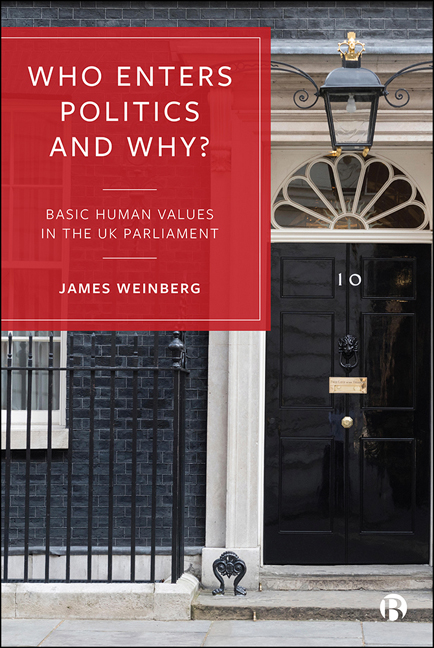Book contents
- Frontmatter
- Dedication
- Contents
- List of Figures and Tables
- Note on the Author
- Acknowledgements
- 1 Why Do We Hate Politicians?
- 2 Psychological Scrutiny: Who Enters Politics and Why?
- 3 All the Same! Demographic Homogeneity and Careerism
- 4 Basic Values and Partisanship
- 5 Parliamentary Behaviour: Personal Choices, Political Results
- 6 Perfect Politicians? Voting Preferences in the United Kingdom
- Notes
- Appendix A Twenty Item Portrait Values Questionnaire (TwIVI)
- Appendix B Confirmatory Factor Analysis of Survey data on the Basic Values of Politicians (UK Members of Parliament, N = 168)
- Appendix C External Correlations Across Samples
- Appendix D Conjoint Experiment of Candidate Preferences by Partisanship
- References
- Index
4 - Basic Values and Partisanship
Published online by Cambridge University Press: 12 March 2021
- Frontmatter
- Dedication
- Contents
- List of Figures and Tables
- Note on the Author
- Acknowledgements
- 1 Why Do We Hate Politicians?
- 2 Psychological Scrutiny: Who Enters Politics and Why?
- 3 All the Same! Demographic Homogeneity and Careerism
- 4 Basic Values and Partisanship
- 5 Parliamentary Behaviour: Personal Choices, Political Results
- 6 Perfect Politicians? Voting Preferences in the United Kingdom
- Notes
- Appendix A Twenty Item Portrait Values Questionnaire (TwIVI)
- Appendix B Confirmatory Factor Analysis of Survey data on the Basic Values of Politicians (UK Members of Parliament, N = 168)
- Appendix C External Correlations Across Samples
- Appendix D Conjoint Experiment of Candidate Preferences by Partisanship
- References
- Index
Summary
‘[W] e have a role beyond making the machine here work better for everybody and that is, without being too grand about it, we have a national purpose being here. It is to make ourselves redundant.’
Anonymous MP (Interviewee 4)Political parties carry out roles and functions that are pivotal to liberal democracies. In recent years political parties have, however, been the subject of intense criticism for catalyzing popular disengagement with politics and stoking unrest by capitalizing upon some citizens’ political fears or intolerances. At the same time, a vernacular of ‘cartel’ parties current in political science connects the strategic organization and functioning of political parties with their apparent inability to mobilize citizens to participate in politics or trust in other political institutions (Mair, 2003; Hay, 2007; Katz and Mair, 2009). They are, then, as much a part of the anti-political tidal wave discussed in Chapter 1 as politicians themselves. Yet as Lisa Herman (2017, p 2) rightly points out, ‘parties are criticized precisely because they are so important as agents in democratic government’ (see also Kitschelt, 2006; Schattschneider, 2009). Political parties run campaigns and raise funds to do so, they provide manifestos of policy pledges capable of uniting disparate public interests, they turn electoral majorities into governing agendas and form the majorities in parliament capable of seeing those agendas through to fruition, and they hold governments to account whenever they do not win elections. The dominant literatures examining how and when parties fail at these democratic tasks tends to focus upon survey-based indicators of citizens’ trust, partisan identification and party membership, and public opinion (eg Dalton and Wattenberg, 2000; Biezen and Poguntke, 2014). In contrast, it is argued that academe should pause to consider a potentially more interesting story about the root causes of partisanship and the psychological similarities or differences between politicians from different parties, and indeed between politicians and their voters, that might precipitate ‘good’ or’ ‘bad’ democratic performance.
It is in this context that this book now turns to explore the relationship between basic values and partisanship in the UK in order to provide an additional answer to who enters politics and how are they different to the general public?
- Type
- Chapter
- Information
- Who Enters Politics and Why?Basic Human Values in the UK Parliament, pp. 79 - 106Publisher: Bristol University PressPrint publication year: 2020



